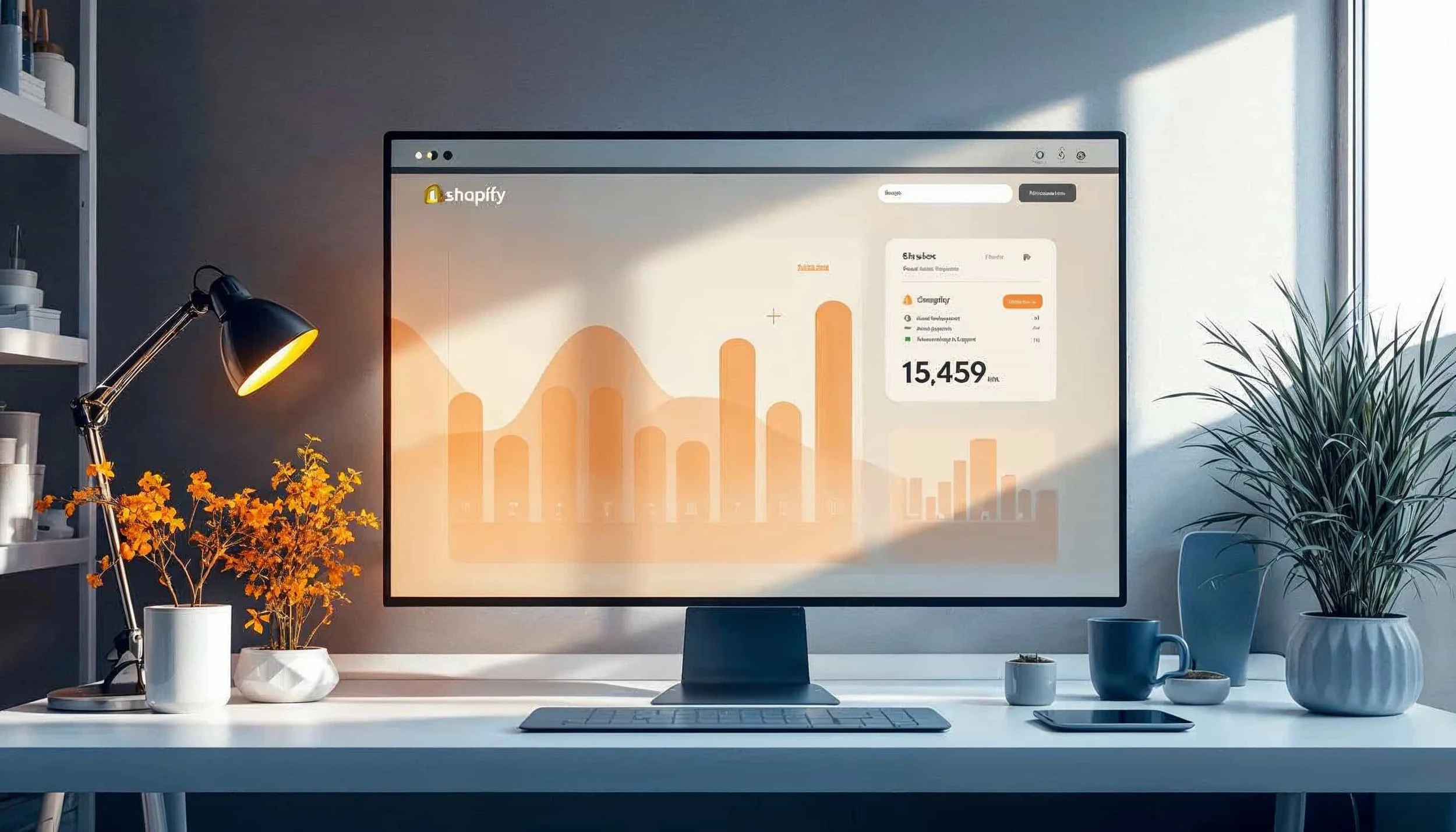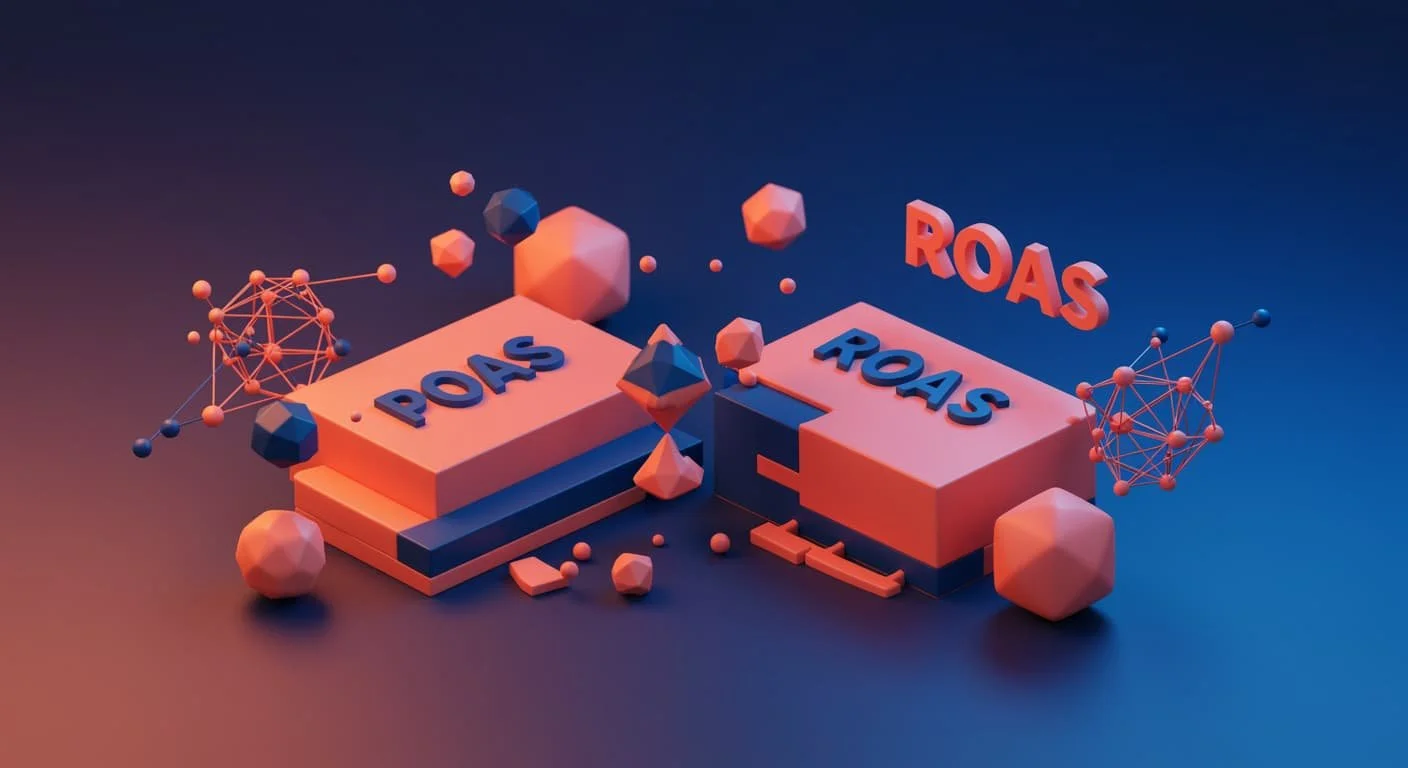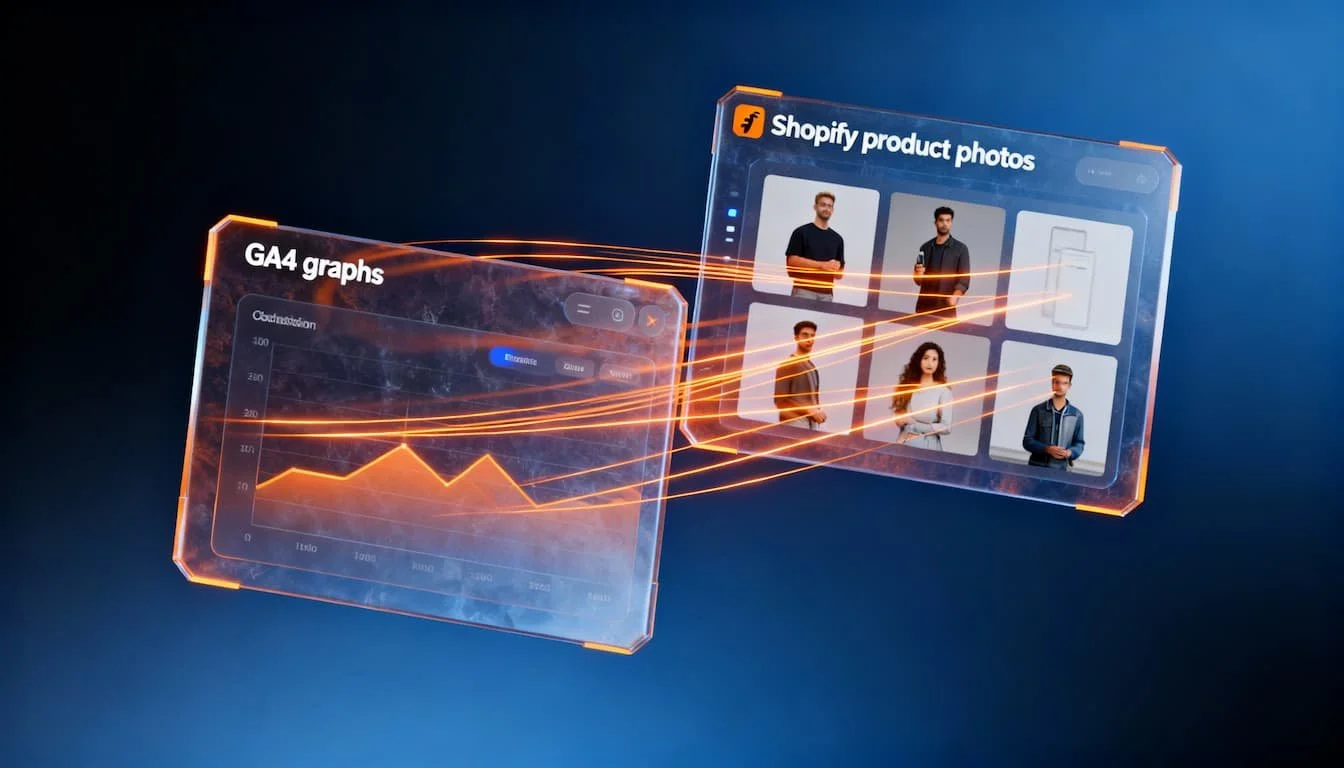AI and Shopify: Smart Apps and Automations for 2026
E-commerce entrepreneurs face a choice: embrace the AI revolution or fall behind the competition. Shopify webshops that automate smartly see their efficiency increase by 40% and their conversion rates by 25%. In this article, discover which AI tools and automations will make a difference in 2026.
- 15-30% efficiency gain: AI tools for small webshops within 6 months with correct implementation
- 10 essential apps: Shopify Magic, Tidio, ReConvert, Hypotenuse, Klaviyo, AdScale, Copysmith, LimeSpot, Flair, Vue.ai
- No technical knowledge: Plug-and-play tools, Shopify Flow for automations without programming
- Time-saving automations: 60% of customer questions answered automatically, bulk product descriptions in minutes
- Local focus on efficiency: AI translations, smart inventory management, automatic ads for small teams
- Future of predictive AI: Systems that automatically optimize campaigns, inventory, and prices
Why AI automation is becoming essential for Shopify webshops
The e-commerce market is growing exponentially, but customer expectations are rising even faster. Consumers want the right product recommendations, instant answers to questions, and personalized experiences within seconds. For SMEs, this presents a challenge: how do you deliver enterprise-level service without a large team?
The answer lies in smart automation. AI tools for Shopify are no longer a luxury, but a necessity to remain competitive. This aligns with the broader trend of AI-driven marketing that we increasingly see in successful webshops.
“E-commerce businesses that implement AI tools see an average of 23% higher conversion rates within 6 months.”
The power of AI in numbers
Recent research by Shopify Plus shows that webshops with AI automation:
Generate 42% more repeat purchases
Answer customer questions 35% faster
Achieve 28% higher average order value
Spend 51% less time on repetitive tasks
These results are not exclusive to large companies. Local Shopify webshops also benefit from the accessibility of modern AI tools. Performance marketing and AI go hand in hand for optimal results.
The 12 best AI tools for Shopify in 2026
1. Shopify Magic - Native AI content generation
Shopify's own AI assistant integrates seamlessly with your dashboard. The tool automatically generates:
SEO-optimized product descriptions
Meta descriptions and alt texts
FAQ sections based on product features
Variations for A/B testing
Cost: Free for all Shopify users Best feature: Tone of voice adjustment per product category
This combines perfectly with AI content creation strategies for a consistent brand experience.
“AI chatbots can automatically handle 67% of standard customer inquiries, freeing up teams for more complex tasks.”
2. Tidio - AI chatbot and customer service automation
Tidio combines live chat with intelligent automation. Its AI learns from every conversation, becoming more accurate as more customers interact with it. This is a perfect complement to lead generation strategies.
Key features:
24/7 automated customer service
Integration with WhatsApp and Facebook Messenger
Multilingual support for international webshops
Smart triggers based on customer behavior
Cost: From €18/month for small webshops
AI agents for marketing like Tidio are becoming increasingly important for effective customer service.
3. Klaviyo Predictive Analytics - Smart Email Marketing
Klaviyo's AI analyzes customer behavior and predicts the perfect moment for each email. The tool automatically identifies:
Customers with high churn probability
Optimal send times per segment
Products with cross-sell potential
Lifetime value predictions
"Klaviyo's predictive analytics increased our email ROI by 67% through better timing and personalization." Marie Dubois, Marketing Manager at fashion-boutique-brussel.be
4. Hypotenuse AI - Bulk Content Generation
For webshops with large product catalogs, Hypotenuse AI is a game-changer. The tool generates hundreds of unique product descriptions simultaneously, all optimized for search engines. Combine this with local SEO strategies for maximum visibility.
Unique advantages:
Bulk import via CSV files
Automatic keyword integration
Multi-language support
Brand voice consistency check
This complements what we see in AI vs. human copywriting: the strength lies in combining both.
5. AdScale - AI-Driven Advertising
AdScale automates your complete Google Ads and Meta campaigns. The AI analyzes performance in real-time and automatically adjusts bidding strategies, target audiences, and creatives. This aligns perfectly with performance marketing strategies.
ROI impact:
On average 43% lower cost per acquisition
38% higher ROAS within 30 days
Automatic budget optimization
Predictive scaling during peak periods
For webshops considering Google Ads vs Facebook Ads, AdScale offers an integrated solution for both platforms.
6. LimeSpot Personalizer - Dynamic product recommendations
LimeSpot shows each customer different product recommendations based on their browsing behavior, location, and purchase history. The AI adapts in real-time during the shopping journey. This is an essential part of CRO strategies.
Conversion boost:
32% higher average order value
24% more items per order
41% improved customer retention
Cross-sell effectiveness +89%
Personalization is becoming increasingly important, as we describe in our article on mobile optimization.
7. ReConvert - Post-purchase upselling
ReConvert places intelligent upsell offers on your thank-you page when customers are most receptive to additional purchases.
Smart features:
AI-driven product matching
Dynamic discount optimization
One-click checkout for upsells
Automated thank you page personalization
8. Copysmith - AI content suite for marketing
Copysmith generates all the marketing content you need: from ad copy to complete landing pages. The tool integrates perfectly with top AI tools for marketers.
Content types:
Google Ads headlines and descriptions
Facebook/Instagram ad copy
Email subject lines and body text
Product listing optimization
Blog content outlines
For those who want to learn more about effective AI usage: check out our guide on writing better prompts.
9. Flair - Smart product badges and labels
Flair uses AI to assign dynamic product labels that create urgency and boost conversions.
Automatic badges:
"Trending now" for popular items
"Almost sold out" for low stock
"Bestseller" for top performers
"New" for recently added products
10. Vue.ai Stylist - Visual AI for fashion
For fashion stores, Vue.ai offers a virtual stylist that curates outfits and provides style advice based on customer preferences.
Fashion-specific AI:
Color and style matching
Trend forecasting
Virtual try-on integration
Seasonal recommendations
11. Judge.me AI Reviews - Intelligent review management
Judge.me's AI analyzes customer reviews and automatically generates responses, identifies trends, and prevents fake reviews.
Review automation:
Auto-response based on sentiment
Review request timing optimization
Multilingual review translation
Competitor review monitoring
12. Searchanise - Smart site search
Searchanise offers AI-powered search functionality that understands what customers are truly looking for, even with typos or vague queries.
Search optimization:
Natural language processing
Visual search for fashion/furniture
Voice search compatibility
Autocomplete with product suggestions
“Personalization engines increase the average order value by 19% through better product recommendations and timing.”
ROI calculation: what does AI automation truly cost?
The investment in AI tools quickly pays for itself. Here is a realistic cost calculation for an average Shopify webshop:
Monthly AI tool costs:
Shopify Magic: €0 (free)
Tidio chatbot: €18
Klaviyo email AI: €45
Hypotenuse content: €29
AdScale advertising: €99
LimeSpot personalization: €39
Total: €230/month
Expected savings and additional revenue:
Content time savings: 20 hours/month × €25/hour = €500
Increased conversion: €10,000 revenue × 25% = €2,500 additional
Lower advertising costs: €1,000 × 20% = €200
Improved customer lifetime value: €15/customer × 100 customers = €1,500
Total benefit: €4,700/month Net ROI: €4,470/month (1945% return)
“Automated A/B testing of ad copy improves ROAS by an average of 31% through continuous optimization.”
Implementation Roadmap: Integrating AI Step-by-Step
Month 1: Basic Automation
Install Shopify Magic for product descriptions
Set up Tidio chatbot for customer service
Start with basic Shopify Flow workflows
Optimize existing content with AI
Month 2: Marketing Automation
Implement Klaviyo predictive analytics
Install ReConvert for post-purchase upselling
Launch AdScale for automated advertising
Set up advertising strategies with advanced email flows
Month 3: Advanced Personalization
Activate LimeSpot product recommendations
Integrate Judge.me for review management
Implement Flair smart badges
Test and optimize all workflows
Month 4: Scaling and Optimization
Analyze the performance of all tools
Deactivate less effective apps
Optimize successful workflows
Plan the next automation phase
“For local e-commerce shops, it's all about efficiency – AI ensures that small teams can make a big impact.”
AI Trends for Shopify in 2026 and Beyond
Voice commerce integration
Smart speakers are becoming more important for e-commerce. Shopify is already testing voice ordering via Alexa and Google Assistant. Expect native voice commerce features in 2026. Read more about voice search optimization.
Augmented reality shopping
AR functionality will become standard for product previews. Apps like Shopify AR make virtual try-on accessible for all webshops.
Predictive inventory management
AI predicts demand with increasing accuracy. Shopify Plus is developing native demand forecasting for automated inventory management.
Conversational commerce
Chatbots are evolving into shopping assistants that handle complete purchases through natural conversations. Check out our ChatGPT masterclass for more insights.
Sustainability AI
Tools that automatically calculate the CO2 footprint of orders and propose carbon-neutral shipping options, in line with sustainable e-commerce strategies.
Common mistakes in AI implementation
1. Installing too many tools at once
Start with 2-3 core tools and gradually expand. Too many simultaneous changes make it difficult to measure impact.
2. Not defining clear KPIs
Determine in advance which metrics you want to improve: conversion, average order value, customer lifetime value, or operational efficiency.
3. Not linking AI tools together
The power lies in integration. For example, link Klaviyo to LimeSpot for consistent personalization across touchpoints. A good AI audit helps identify integration opportunities.
4. Insufficient data for machine learning
AI needs data to learn. Start with tools that have immediate impact, even with limited historical data. Structured data implementation also helps - read more about structured data for Google.
5. No fallback scenarios
What happens if an AI tool goes offline? Ensure manual backup processes for critical functionalities.
“AI is transforming performance marketing from reactive to predictive - we can now predict which campaigns will succeed.”
Local optimization for Dutch and Belgian webshops
Multilingual AI content
For webshops in the Netherlands and Belgium, multilingual content is essential. Tools like Hypotenuse AI and Copysmith support automatic translations with local nuances. Combine this with SEO vs SEA strategies for maximum impact.
GDPR-compliant automation
European privacy legislation requires explicit consent for data usage. Configure AI tools with GDPR compliance:
Cookie consent for personalization
Opt-in for email automation
Data retention limits
Right to be forgotten workflows
Local payment preferences
Integrate AI tools with local payment methods such as iDEAL, Bancontact, and SOFORT. Shopify Flow can automatically suggest the best payment option for each customer.
Timezone-aware automation
Align email and notification timing with local time zones for better engagement rates. This is important for effective LinkedIn marketing strategies.
Measurable results: cases from Dutch webshops
Case 1: Outdoor Adventures Amsterdam
Challenge: Low conversion among international visitors AI Solution: LimeSpot personalization + Tidio multilingual chat Result:
34% higher conversion for German customers
28% higher average order value
67% less cart abandonment
Case 2: Organic Baby Products Utrecht
Challenge: High customer service workload AI Solution: Tidio AI + Judge.me automated responses + Klaviyo predictive flows Result:
71% less manual customer service
43% faster response times
89% customer satisfaction score
Case 3: Fashion Boutique Rotterdam
Challenge: Low repeat purchase rate AI Solution: Vue.ai styling recommendations + ReConvert upselling + Flair urgency badges Result:
56% more repeat purchases within 90 days
41% higher customer lifetime value
23% improved email click-through rates
For more inspiration, check out our e-commerce innovation analysis and discover why more and more entrepreneurs are choosing Shopify.
The future: what comes after 2026?
Autonomous e-commerce
Fully automated webshops that independently:
Purchase products from suppliers
Adjust prices based on market conditions
Identify new product categories
Handle customer service entirely
This aligns with broader developments in GEO strategies and SEO evolution.
Emotional AI
Systems that recognize customers' emotional state via:
Browsing patterns
Mouse movement analysis
Voice sentiment in customer service
Facial recognition (with consent)
Quantum-enhanced personalization
Quantum computing enables hyper-personalization at a level currently unimaginable.
Blockchain-verified AI
Transparent AI decisions where customers can see why specific recommendations are made. This becomes important in light of zero-click search developments.
Step-by-step plan: start your first AI automation today
Step 2: Choose your first AI tool (15 minutes)
For content: start with Shopify Magic (free)
For customer service: install Tidio (€18/month)
For email: upgrade to Klaviyo AI features (from €20/month)
For ads: test AdScale (30-day free trial)
Also consider AI training for your team to make optimal use of these tools. 1: Audit your current processes (30 minutes) Identify the 3 most time-consuming tasks in your webshop:
Writing product descriptions
Answering customer inquiries
Creating email campaigns
Optimizing ads
Step 2: Choose your first AI tool (15 minutes)
For content: start with Shopify Magic (free)
For customer service: install Tidio (€18/month)
For email: upgrade to Klaviyo AI features (from €20/month)
For ads: test AdScale (30-day free trial)
Step 3: Measure baseline performance (1 day)
Document current metrics before AI implementation:
Conversion rate
Average order value
Email open/click rates
Customer service response time
Time spent on content creation
Step 4: Implement and monitor (1 week)
Install the chosen tool via Shopify App Store
Configure according to best practices
Train your team on its usage
Monitor performance daily
Step 5: Optimize and scale (monthly)
Analyze results after 30 days
Optimize settings
Add the next AI tool
Document learnings for the team
Conclusion: why waiting is not an option
E-commerce is evolving rapidly. Webshops that invest in AI automation now are building a competitive advantage that will become increasingly difficult to catch up with. The tools are accessible, affordable, and proven effective. This aligns with the broader trend of performance marketing in the AI era.
The question is not whether you will use AI, but when you start and how quickly you scale. Every day you wait, competitors pull further ahead. Combining SEO and AI is becoming increasingly important for organic growth.
Start with one tool today. Measure the impact. Scale systematically.
Do you need help choosing the right AI strategy for your Shopify webshop? Our Shopify e-commerce team would be happy to assist you. For a complete digital transformation, you can also explore our online marketing services.
Also check out our projects for inspiration, such as the digital success story of Bastiano, or discover the benefits of a digital expert for your business.

🚀 More leads, higher conversion, better ROI
This article provided you with insights. Now it's time for action. Whether you want to build a profitable webshop, generate more revenue from performance marketing or SEO, or grow with AI marketing - we provide concrete support to help you move forward.
💬 Discuss your challenge directly with Frederiek: Schedule a free strategy consultation or send us a message
📧 Prefer to email? Send your question to frederiek@clickforest.com or call +32 473 84 66 27
Strategy without action remains theory. Let's take your next step together.
Frequently asked questions about AI and Shopify
-
Start with Shopify Magic (free), Tidio for customer service (€18/month), and Klaviyo for email automation (from €20/month). These three tools cover the main automation needs.
-
On average, small webshops save 15-25 hours per week and increase their revenue by 20-40% within 6 months through smart automation.
-
No, modern AI tools are plug-and-play. Installation works via the Shopify App Store, and configuration is done through intuitive interfaces.
-
Focus on concrete KPIs: conversion rate, average order value, customer lifetime value, email open rates, and operational efficiency (hours saved).
-
Yes, all mentioned tools support GDPR compliance. Configure cookie consent, opt-in procedures, and data retention limits according to European legislation.
-
Shopify Magic (free) and ReConvert (€9/month) usually deliver noticeable results within days because they directly improve conversion and content efficiency.
-
No, but AI can automate 60-80% of standard inquiries. Complex cases and personal situations still require human input.
-
Configure tone of voice settings, use brand-specific keywords, and review/edit AI content before publishing it. Combine AI efficiency with human creativity.
-
Voice commerce, augmented reality shopping, predictive inventory management, and conversational commerce are becoming mainstream for Shopify webshops. Read more in our trend analysis for Shopify apps.
-
Absolutely. The power lies in integration: for example, link Klaviyo email AI to LimeSpot product recommendations for consistent personalization across all touchpoints. An AI audit for SMEs helps identify the best combinations.
Sources & References
AI in e-commerce and Shopify:
Shopify: ‘AI in Ecommerce 2025: 7 Use Cases & A Complete Guide’ – https://www.shopify.com/blog/ai-ecommerce
Shopify: ‘How To Use AI (2025): Applications for Ecommerce Stores’ – https://www.shopify.com/il/blog/how-to-use-ai
Shopify: ‘Ecommerce Marketing Automation in 2025: Email, SMS & Retargeting’ – https://www.shopify.com/enterprise/blog/automation-complexity
Sanomads: ‘Complete Guide to Shopify AI in 2025: Tools, Trends & Strategies’ – https://sanomads.com/blogs/topics/complete-guide-to-shopify-ai-in-2025-tools-trends-strategies
Tool-specific impact (chatbots, email, personalization):
Tidio: ‘10+ Crucial AI Customer Service Statistics (2026)’ – https://www.tidio.com/blog/ai-customer-service-statistics/
Tidio review: ‘Tidio (AI-Powered Customer Service Platform & Live Chat)’ – https://toptenaiagents.co.uk/reviews/tidio.html
Klaviyo case study: ‘Willow Tree Boutique grows campaign revenue 50%+ with AI’ – https://www.klaviyo.com/customers/case-studies/willow-tree-boutique-predictive-analytics
BrandCrock: ‘Best AI Tools for Shopify (2025) to Boost Sales & Automate Tasks’ – https://www.brandcrock.com/blog/e-commerce/shopify/best-ai-tools-for-shopify-2025/











